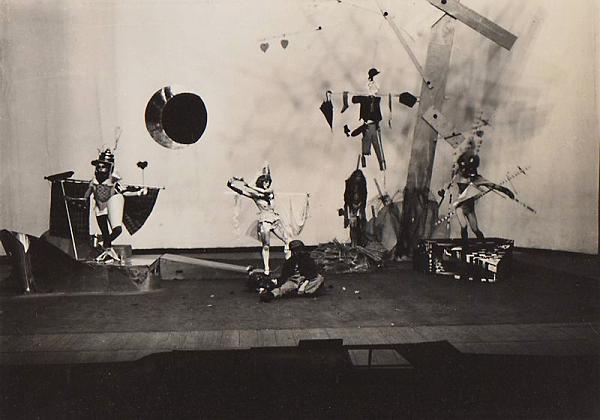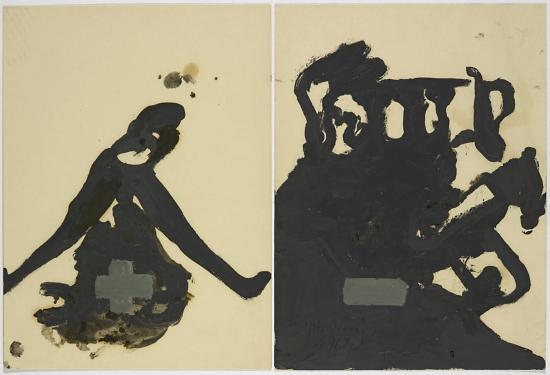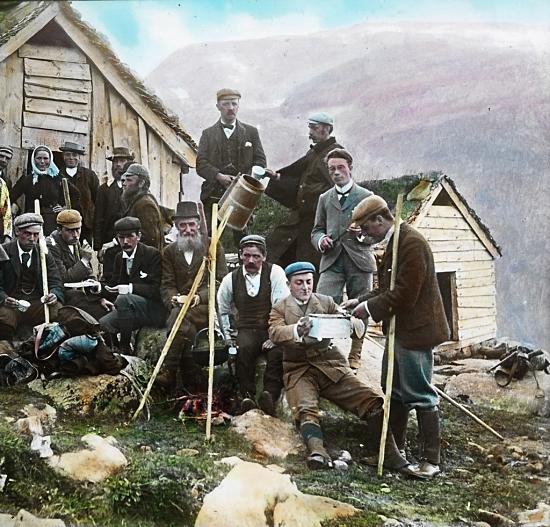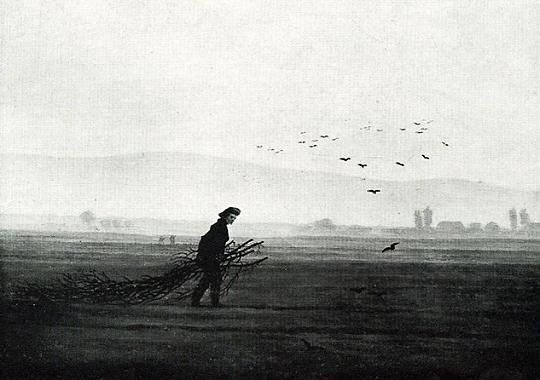|

Interior
Strandgade 30
1901
Vilhelm Hammershųi
(May 13, 1864 – 13 February 13, 1916)
_______________________
I dwell in Possibility –
A fairer House than Prose –
More numerous of Windows –
Superior – for Doors –
Of Chambers as the Cedars –
Impregnable of eye –
And for an everlasting Roof
The Gambrels of the Sky –
Of Visitors – the fairest –
For Occupation – This –
The spreading wide my narrow Hands
To gather Paradise –
It sifts from Leaden Sieves -
It powders all the Wood.
It fills with Alabaster Wool
The Wrinkles of the Road -
It makes an even Face
Of Mountain, and of Plain -
Unbroken Forehead from the East
Unto the East again -
It reaches to the Fence -
It wraps it Rail by Rail
Till it is lost in Fleeces -
It deals Celestial Vail
To Stump, and Stack - and Stem -
A Summer’s empty Room -
Acres of Joints, where Harvests were,
Recordless, but for them -
It Ruffles Wrists of Posts
As Ankles of a Queen -
Then stills it’s Artisans - like Ghosts -
Denying they have been -
Emily Dickinson
(December 10, 1830 – May 15, 1886)
_______________________

Soldier of the First Division
1914
Kazimir Malevich
d. May 15, 1935
_______________________
The Master and Margarita [pdf]
Michail Bulgakov
May 15, 1891 – March 10, 1940
translated by Michael Glenny
(....)
How sad, ye gods, how sad the world is at evening, how mysterious the mists over the swamps. You will know it when vou have wandered astray in those mists, when you have suffered greatly before dying, when you have walked through the world carrying an unbearable burden. You know it too when you are weary and ready to leave this earth without regret; its mists, its swamps and its rivers ; ready to give yourself into the arms of death with a light heart, knowing that death alone can comfort you.
The magic black horses were growing tired, carrying their riders more slowly as inexorable night began to overtake them. Sensing it behind him even the irrepressible Behemoth was hushed, and digging his claws into the saddle he flew on in silence, his tail streaming behind him.
Night laid its black cloth over forest and meadow, night lit a scattering of sad little lights far away below, lights that for Margarita and the master were now meaningless and alien. Night overtook the cavalcade, spread itself over them from above and began to seed the lowering sky with white specks of stars.
Night thickened, flew alongside, seized the riders' cloaks and pulling them from their shoulders, unmasked their disguises. When Margarita opened her eyes in the freshening wind she saw the features of all the galloping riders change, and when a full, purple moon rose towards them over the edge of a forest, all deception vanished and fell away into the marsh beneath as their magical, trumpery clothing faded into the mist.
It would have been hard now to recognise Koroviev-Faggot, self-styled interpreter to the mysterious professor who needed none, in the figure who now rode immediately alongside Woland at Margarita's right hand. In place of the person who had left Sparrow Hills in shabby circus clothes under the name of Koroviev-Faggot, there now galloped, the gold chain of his bridle chinking softly, a knight clad in dark violet with a grim and unsmiling face. He leaned his chin on his chest, looked neither at the moon nor the earth, thinking his own thoughts as he flew along beside Woland.
'Why has he changed so? ' Margarita asked Woland above the hiss of the wind.
'That knight once made an ill-timed joke,' replied Woland, turning his fiery eye on Margarita. ' Once when we were talking of darkness and light he made a somewhat unfortunate pun. As a penance he was condemned to spend rather more rime as a practical joker than he had bargained for. But tonight is one of those moments when accounts are settled. Our knight has paid his score and the account is closed.'
(....)
.....................................................
The Master and Margarita [pdf]
Mikhail Bulgakov
Translated from Russian by Richard Pevear and Larissa Volokhonsky
Mikhail Bulgakov’s The Master and Margarita, Animated in Two Minutes
_______________________

Vilhelm Hammershųi
_______________________
The Lethality of Loneliness
We now know how it can ravage our body and brain
Judith Shulevitz
_______________________
Depression within Marxism
stux
Demand Nothing
via Forgottenness
_______________________
that the culture of the book is dead; that the solitude of the mind is dead.
Arran James
attempts at living
(....)
... The internet has always been a way of organising as much as it has of distraction; of communication as much as noise; as much to do with bodies as it has to do with the disappearance of bodies.
We may well be alone in here, but I also wonder if that isn’t therapeutic at times. Out there (or ‘over there’ in Will Self’s words for the Australian-Iraqi nightmare interzone of ‘The Butt’) we are too upclose at times, too forced together, in these pockets of affective manipulation, enforced happiness (cf. Houellebecq and democracy), of the psychopolitical normalisation of unhappy subjects, the regulation of unhealthy bodies, and so on. Sometimes alone is good. At the same time, an excessive alone-togetherness, an arrangement of disembodied minds in cyber-seriality, is no good, can lead to the emergence of psychopathologies, of anti-social behaviours and psychologies, distorted logics, and utopian flights from fantasy. This means things are dangerous, these technologies are dangerous, it doesn’t mean that they necessarily give rise to these things, ex nihilo, from nowhere: the question of supply and demand is a question of desire; of its inculcation, its habituation, its naturalisation; all processes that can come undone, be interfered with, disrupted. Then, as a psychiatric worker, I have this question about psychopathology and anti-sociality: do we mean distressing, desubjectivating, crippling, or do we mean different, bad, not normal. The question is one that strikes throughout the history of psychiatry, and is best expressed today in the neurodiversity movement. Autism is a form of neurodiversity! they cry, as if difference were the sole consideration, the only factor that can be made to count. What kind of diversity? What are the effects? What is adaptive and maladaptive, in what ways does it help you cope and in what ways does it prevent coping?
If the problem is that the new accelerative technologies burn us out then its not luddism we need, it’s a way to distance ourselves from those technologies, to cultivate spaces of deceleration and destimulation, but also to foster a kind of techno-literacy- rather like the campaigns of the old working class for the right to read- and ‘perceptual training’
...(more)
_______________________

Rooms by the Sea
Edward Hopper
(July 22, 1882 – May 15, 1967)
_______________________
After great pain, a formal feeling comes –
The Nerves sit ceremonious, like Tombs –
The stiff Heart questions ‘was it He, that bore,’
And ‘Yesterday, or Centuries before’?
The Feet, mechanical, go round –
A Wooden way
Of Ground, or Air, or Ought –
Regardless grown,
A Quartz contentment, like a stone –
This is the Hour of Lead –
Remembered, if outlived,
As Freezing persons, recollect the Snow –
First – Chill – then Stupor – then the letting go –
Emily Dickinson

Still Life with Flowers
Paul Aļzpiri
b. May 14, 1919
_______________________
from Memoirs of My Nervous Illness
Daniel Paul Schreber (1842-1911)
Translation from German by Ida McAlpine and Richard A Hunter
Outsider Poems, a Mini-Anthology in Progress (53)
Jerome Rothenberg
(....)
3/
The infringement of the freedom of human thinking or more correctly thinking nothing, which constitutes the essence of compulsive thinking, became more unbearable in the course of years with the slowing down of the talk of the voices, This is connected with the increased soul-voluptuousness of my body and — despite all writing-down — with the great shortage of speech-materials at the disposal of the rays with which to bridge the vast distances separating the stars, where they are suspended, from my body.
...(more)
_______________________
The whole society deal
Roger Gathman
(....)
... The homogeneous society, in which the archaic has no place to hide, is the effect of the penetrative tendency of capitalist culture, which roots out its opponents from the intimate sphere. Of course, its opponents might produce the elbow room that makes capitalism tolerable – and capitalist overreach might well be keyed to the sound of a gravedigger digging his own grave, which is what Marx heard. We at this point give capitalism much more time than Marx could give it in the nineteenth century, and we can watch the process of total change. Ethan Watters, a journalist, has pointed out that the variegated understanding of emotions in different cultures are in the process of being changed, or at least confronted, by an American model that is convenient to Big Pharma. This is from a NYT magazine article he wrote on the subject:
“We have for many years been busily engaged in a grand project of Americanizing the world’s understanding of mental health and illness. We may indeed be far along in homogenizing the way the world goes mad.
This unnerving possibility springs from recent research by a loose group of anthropologists and cross-cultural psychiatrists. Swimming against the biomedical currents of the time, they have argued that mental illnesses are not discrete entities like the polio virus with their own natural histories. These researchers have amassed an impressive body of evidence suggesting that mental illnesses have never been the same the world over (either in prevalence or in form) but are inevitably sparked and shaped by the ethos of particular times and places. In some Southeast Asian cultures, men have been known to experience what is called amok, an episode of murderous rage followed by amnesia; men in the region also suffer from koro, which is characterized by the debilitating certainty that their genitals are retracting into their bodies. Across the fertile crescent of the Middle East there is zar, a condition related to spirit-possession beliefs that brings forth dissociative episodes of laughing, shouting and singing.”
No matter – all madnesses must get in line! Or so it would seem as the Blue Pill bears down....(more)
_______________________

Juanito Laguna
Antonio Berni
b. May 14, 1905
_______________________
‘Another World is Possible’
interview with Colin Wright, author of Badiou in Jamaica: The Politics of Conflict
You describe Alain Badiou’s philosophy as revolving around three key questions: i) How does genuine novelty enter the world? ii) How is it distinct from mundane change? iii) And how can it be made to endure? And yet capitalism has become so hegemonic in recent years that it has become pretty difficult to even imagine an alternative to it.
I think the problem you describe, of the commodification of the political imaginary by capitalism, is a very serious one, especially given that this extends to images of resistance to capitalism as well (I refer to this in Badiou in Jamaica a few times as 'rebel chic'). Zizek's reading of the epidemic of apocalyptic Hollywood disaster movies is relevant here. He suggests that capitalism's hold on the collective imaginary is such that it is now far easier, particularly in the face of mounting evidence of environmental catastrophe, to picture the whole planet going up in flames, than it is to conceive of the end of capitalism. So it's a serious problem. I also think that part of addressing this problem does indeed have to take place on the level of the political imaginary itself. For all its many problems, at least the motto of the World Social Forum that 'Another World is Possible' acknowledges the need for an imaginative space in which alternatives to capitalism can be elaborated. But it certainly can't be addressed only at that level, since enormous amounts of energy can be wasted on building utopian visions, when significant change, at least from a Marxist perspective, never comes only from ideas.
...(more)
_______________________
Capitalist Realism [pdf]
An Interview with Mark Fisher
(....)
Depressive hedonia would be just a way of thinking about the form that depression takes in a world where stimulus is always available, I think. I don’t think we’ve remotely got to grips with the affective consequences of the kind of cyberspace-matrix that the young especially are embedded in.
Part of what I’m describing in the book really is the tensions between a kind of crumbling disciplinary framework – in which teachers are there as these prison-guards of this collapsing system. – Well, on the one hand they are prison guards. On the other hand, they’re required to interface with this constant world of stimulus, and be entertainers. – There’s a tension between being a prison guard and an entertainer – it’s pretty difficult to say the least. In terms of depressive hedonia, depression is usually described as a case of anhedonia, where the sufferer of depression is unable to derive pleasure from anything. It seemed to me that there’s almost an opposite syndrome in place with teenagers, where pleasure is so easily available that, well, that it’s this very availability of pleasure that’s depressing in many cases. I guess there’s a kind of consumer model of pleasure which is involved, which doesn’t build up people’s sense of self-esteem, sense of well-being, or perhaps more importantly a sense of involvement in things. Instead of that you’ve got this kind of rapid-fire small bursts of pleasure. And one of things that’s removed by this is a kind of productive boredom.
(....)
R: In a talk you gave about ‘Capitalist Realism’ earlier this year you called for the development of a ‘leftist psychotherapy’. Could you explain what you mean by this?
M: This is really serious, I think. Since there are so many people who are depressed – and I maintain that the cause for much of this depression is social and political – then converting that depression into a political anger is an urgent political project. Of course it’s not only about that. It’s also about levels of real distress and suffering in society, which can not be handled or dealt with by the individualising, privatised assumptions of the dominant forms of treatment in mental illness, which are, in this country, cognitive behavioural therapy – which is a kind of combination of positive thinking and kind of psychoanalysis light: the focus on family background of the sufferer, and on then of converting thought patterns from these negative into positive ones. There’s that. And on the other hand, brain chemistry focus – the horrible loop whereby massive multinational pharmaceutical companies sell people drugs in order to cure them from the stresses brought about by working in late capitalism. Neither of these things are very effective – all they do is largely contain people’s depression rather than actually deal with the actual cause of depression. One can apply Marx’s arguments about religion very directly to this – that religion was the opium of the masses. Anti-depressants and therapy are the opium of the masses now, in lots of ways. That isn’t to say that they don’t do anything at all. They do in many cases relieve intense suffering, which people are undergoing. But it’s just the same as religion. As Marx said, it’ll make people better in a kind of savage and pitiless world – religion wants real comfort to people in the same way, in a world of relentless competition, of digital hyper-stress, etc. Being able to talk to someone for an hour in cognitive behavioural therapy or having something which will take the edge of things via antidepressants – that will make people feel better, but just as with religion, it doesn’t get to the sources of that sort of misery in the first place. It in fact obfuscates it.If you want to look at the rise of capitalist realism, one can also look at the decline of anti-psychiatry. As anti-psychiatry declined, then capitalist realism grew. I think there’s a relation there between the two. That normalization of misery as part of the privatization of stress has been absolutely central to the rise of capitalist realism.
How do we get beyond that? ...
via Attempts At Living
_______________________

Party of the Bockbierkandidaten
ca. 1927-28
T. Lux Feininger
Experiment - Life - Politics
Bauhaus Photography X Russian Avant-garde
Galerie Priska Pasquer
via
_______________________
Political Philosophy and the Dead Hand of its History
Gordon Graham
This essay explores the relation between political philosophy and the history of politicalthought. It focuses on this question — Are they allies or rivals? The question arises in partbecause the two disciplines so evidently share a very large number of figures and texts. Thatthe list stretches from Plato and Aristotle through Hobbes and Locke to Marx and Mill isprobably uncontentious. Whether it extends to (say) Rawls and Habermas is moreproblematic. Certainly, these authors are very likely to be studied in courses on ‘contemporary political philosophy’ and much less likely to appear in the reading lists for ‘history of political thought’. For the purposes of studying their philosophical ideas they are not historical figures – at least not yet. _______________________

Paul Aļzpiri
_______________________
Telling it Straight
R. A. Lubowitz
(....)
July, 2012
I wake and my brain is bone dry. A vague recollection that I was to be writing something amusing and purposeful for a writing class. I was supposed to be trying to tell it straight for once. I don’t remember why. It seems so pointless, writing.
I’m spending the day with my daughter. I buy her candy and watch videos on YouTube. I notice her little perfect pinky fingernail as she clicks her way through doll commercials, notice I’ve never taken the time to look at her pinky, and I try to make a mental snapshot although not sure why. That which demands awe again passes through me and it’s gone, I’m a weeping sieve.
There’s a promise of emptiness when I notice beauty. I’m still a child gazing up at the canvas of sky and feeling mainly my own smallness, sadness that I can’t soar to penetrate the mysteries and eat the colors and build castles in the cottony caverns. I can only stand, earthbound, dumbfounded and left out of something I don’t understand.
All the weeping willow trees of Earth, romantic and aching, synesthetic boughs crying and swaying in the winds, the luscious minor chords of sad love, seeing them dance, it will always be, unrequited. The universe’s poetry flat, inaccessible, unless I’m gazing with four eyes, clenched on some hilltop, bathed in oxytocin, with a sapphic blue-skinned soul mate that can’t possibly exist. Now, imprisoned by two eyes and one perspective, I need someone, anyone, to step in my mind, before I toss my cookies in this weightless, transparent box of isolation, this glass elevator through space and time, going up or down or standing still, I’ll never know.
...(more)
Toska Issue Four - Spring 2013
No single word in English renders all the shades of toska. At its deepest and most painful, it is a sensation of great spiritual anguish, often without any specific cause. At less morbid levels it is a dull ache of the soul, a longing with nothing to long for, a sick pining, a vague restlessness, mental throes, yearning. In particular cases it may be the desire for somebody or something specific, nostalgia, love-sickness. At the lowest level it grades into ennui, boredom.
- Vladimir Nabokov

Mario Sironi
b. May 12, 1885
_______________________
(
)
Gabriel Blackwell
Now alone, knock on Bobby (that most famous of wooden noumena, the not-in-use-just-now dummy of ventriloquist Signor Blitz (famed, as you already know, for the spectacle of his opening routine (involving an as-yet unhandled Bobby firing a pistol at Blitz from across the stage as Blitz enters (the ventriloquist, seeming to exhale cordite, having caught the bullet between his teeth (the trick being that Bobby talks all the while (first, professing anger at his constant manipulation by Blitz, then, once he’s pulled the trigger, expressing sorrow at having killed his master (Blitz slumping over on his back opposite Bobby, both thrown backward by the force of the shot (Antonio Blitz, incidentally, formerly strictly a magician, signature illusion: the bullet catch (given up for the safer profession of ventriloquism when the trick went wrong and tore off the outer lobe of his left ear (leaving him with what could with kindness be called an “unfinished” look (proving the man you’ve just seen to be, actually, not Antonio Blitz at all but an impostor (proving him to be, rather, an American, Clive Robertson (claiming to be the “Original Signor Blitz” (having never seen the original “Signor Blitz,” actually a third man, ...(more)
Gabriel Blackwell
Shadow Man: A Biography of Lewis Miles Archer
Gabriel Blackwell
Reviewed by Nathan Huffstutter and Renée E. D'Aoust
The Behavior of Pidgeons
Gabriel Blackwell
conjunctions
Time And Language: An Interview With Gabriel Blackwell
_______________________

Polar Co-Ordinates VI
1980
Frank Stella
b. May 12, 1936)
_______________________
The Abdication of the Cultural Elite
Andrew Reynolds reviews Stephen Schryer's Fantasies of the New Class: Ideologies of Professionalism in Post-World War II American Fiction
electronic book review
(....)... In particular, he scrutinizes the widespread new-class “fantasy” that intellectuals could influence American society by disseminating their own culture, leading “through example rather than through specific social reforms” (6). Schryer discovers this ideology of professionalism at work across a range of late-twentieth-century novels by the likes of Ralph Ellison, Mary McCarthy, Saul Bellow, Marge Piercy, Ursula K. Le Guin, and Don DeLillo. In telling the story of how post-WWII intellectuals, especially those associated with the corporate university, lost touch with their class identity, Schryer offers yet another censure of the new group we apparently love to hate: not straight white men but academics in their precariously leaning ivory tower.
I view Fantasies of the New Class as a companion piece to Andrew Hoberek’s equally outstanding The Twilight of the Middle Class: Post-World War II American Fiction and White-Collar Work. The two studies make identical claims about the structural proletarianization of the professional middle class (PMC), and they cover some common ground - The Adventures of Augie March, Invisible Man, White Noise - in the course of demonstrating how this transformation was resisted or denied within the pages of American novels. Schryer essentially repeats Hoberek’s thesis, yet he also valuably extends it by examining academic sociology alongside literary culture in each chapter. Pairing John Crowe Ransom and Talcott Parsons, Ellison and Gunnar Myrdal, Bellow and Irving Kristol, DeLillo and Christopher Lasch, Fantasies of the New Class provides a broader perspective on the ideology of professionalism expressed by post-WWII American fiction. Schryer’s writing is also like Hoberek’s in its admirable clarity. I particularly appreciated how Schryer stays on his message and avoids bogging down in minutiae or convoluted argument. This sense of purpose is perhaps to be expected, given that Fantasies of the New Class takes to task the conception of intellectual labor as a non-instrumental type of technical expertise, a conception engendering the sort of literary scholarship (e.g., deconstruction) that prides itself on being rigorous, opaque, and impractical. ...(more)
_______________________

+ -
1962
Joseph Beuys
b. May 12, 1921
_______________________

Joseph Beuys
in his former school in Kleve
Gerd Ludwig
Joseph Beuys goes back to his childhood
_______________________
Reflections on the Opacity of Affect
larva lsubjects
(....)
Did my irritation, my affect, really have anything to do with the world of meaning and the signifier in this instance? Please readers, do not misunderstand me. I have no doubts about the importance of phenomenological and semiotic insights. I’ve also experienced first-hand– in my own analysis and in my work with my analysands back in the day when I was still practicing –the profound impact that interventions at the level of meaning and the signifier can have. It’s not a question of saying that the psychiatrist is right and that the anti-psychiatrist, the humanist psychotherapist as they call them at Dusquesne, is wrong. It’s a question of noticing the opacity of affect, the fact that the causes of affect aren’t given to consciousness– a point the structuralists and post-structuralists have repeated ad nauseum in their discussions of the agency of the signifier –and that in some instances, there are causes that aren’t governed by the domain of meaning and the signifier (Catherine Malabou makes this point nicely in The New Wounded).
What I want, I suppose, is a framework where I can have my phenomenology, semiotics, and naturalism too. Here I think back to graduate school. As I dwelled among the phenomenologists, semioticians, structuralists, and post-structuralists, I was also secretly reading the work of biologists, physicists, meteorologists, neurologists, and all the rest. I took joy in this, but also felt ashamed. The phenomenologist in me felt dirty and guilty for taking research conducted in the natural attitude seriously. The critical theorist, Foucaultian, and post-structuralist in me felt ashamed for taking these things seriously when they’re formations of bio-power, capitalism, neoliberalism, patriarchy, and everything else that is bad. The Continentalists in me heard a super-egoic voice crying “scientism!”, “positivism!”. I felt as if I had to read these things under the covers at night with a flashlight. Somehow I felt as if I was betraying Continental axioms by taking these things seriously in addition to phenomenology and the semiotic turn. ...(more)
_______________________

Filz Tv
Joseph Beuys
1970
_______________________
Poems
Lakey Comess
Backdrop dominates silent room,
slab of wood from endangered species,
replica chairs, sparkling tableau, visited
through wide-angle lens coated in petroleum jelly,
transparent, though nothing is as it appears.
Bewildering thermoplastic dream fades in and out,
fragile beyond years, helpless, forlorn, spreads sand on gallery floor,
just where is not immediately clear.
Areas are delineated in miniature ridges, moistened impressionability.
Unusual birds with bright blue feathers fly into excavation.
Diamond merchants huddle in conference away from resolute plotting,
avert eyes from female spectators and exhibition.
Milling about, past recrimination casts a red glow over small dunes.
Your name is a whisper, repeated to no one, least of all, you.
That's the nature of dreams, passing through hour glass at regular intervals,
one hour later this month than last; one hour earlier just past winter.
Take care with your glass-blown smile. It could be misread.
...(more)
otoliths Issue twenty-nine
_______________________

fishing boats
1909
Georges Braque
b. May 13, 1882
_______________________
Is Social Science a Joke?
David Auerbach reviews Richard Biernacki's Reinventing Evidence in Social Inquiry: Decoding Facts and Variables
waggish
(....)
I have to cheer when he cites Erving Goffman and Clifford Geertz as spiritual guardians:
“Whatever it is that generates sureness,” Goffman intimated darkly, “is precisely what will be employed by those who want to mislead us.” Goffman left it to us to discern how the riddle of cognitive framing applies to sociological practice and to one’s framing of one’s own results. Geertz expressed a similar kind of caution more cheerfully: “Keeping the reasoning wary, thus useful, thus true, is, as we say, the name of the game.” The only intellectual building material is self-vigilance, not the reified ingredients “theory” or “method.”
Damn straight.
Biernacki’s points are very well-taken, and his individual critiques are devastating. He has little trouble justifying his main charge:
If you reconstruct how sociologists mix quantitative and text-interpretive methods, combining what is intrinsically uncombinable, you discover leg-pulling of several kinds: from the quantitative perspective, massaging of the raw data to identify more clearly the meanings one “knows” are important or, again, standardized causal interpretations of unique semiotic processes; to zigzagging between quantitative and interpretive logic to generate whatever meanings the investigator supposes should be there.
Each study was narrated as a tale of discovery, yet each primary finding was guaranteed a priori.
Where I have a problem is his suggested retreat to a “humanist” mode of inquiry, which, while extremely attractive to people like myself, does not necessarily solve the underlying problem. I will explain this later....(more)
_______________________

James River
Va. Monitor U.S.S. Onondaga
1864
Selected Civil War Photographs Collection
library of congress
via

Chang Dai-chien
(May 10, 1899 – April 2, 1983)
_______________________
I is not a Subject
Vanessa Place
volta
I is not a subject.
What I is, is a context. In this particular context, I exist as a speaker, as the keynote speaker, if I read my invitation correctly, at this Poetry Colloquium. Representing some part, I suspect, of an argument. An argument about what? If I take my cue from the title of this event, it is an argument about poetic freedom. For, I suppose, or against. It was suggested in my invitation that conceptualism might challenge the—and here I quote from the email description sent me that may or may not still be accurate: “very notion of poetry, the lyric ‘I,’ the autonomous speaking subject, the voice, the human, perhaps even our ideas of creation, creativity, and freedom.” Where, one might add, do I sign up?
But of course I already have. As have you. We are here, all of us volunteers, some paid, some paid better, enacting our particular form of capitalism that rewards the trade in signs and signification, where value is measured in bits and bites of attention. Where what is current is currency. For attention, it need hardly be said, is measured, like each of us, in the moment. The moment being, like each of us, terribly singular and absolutely fungible. Put another way, today’s widget is the eternal soul. That is to say, the transcendent image of the unique individual who thinks carefully, yet collectively. I say transcendent meaning transferrable, I say collective meaning with an eye towards the whole.
...(more)
_______________________

There it is, in so many places
Catherine Darley
Poemas del rķo Wang
Walls.
Clays deserted.
Closed desks, books.
Synagogue, dust, traces.
Covers, hinges – and time stopped.
Absence. Books placed there to wait.
Books rescued from the fire.
Books closed so that the words do not escape.
Books of lead.
Traces written in the dust. A message deprive of a sense. Like the bat which falls when stops to hear.
And you, where are you?
...(more)
_______________________

Rain
1904-05
Mikhail Larionov
d. May 10, 1964
_______________________
Mind the Masses:
A Hobart and William Smith Student Collaboration
crowd theory
full text at I cite
from the introduction
The plethora of information and interpretations of crowds leads to a number of different debates. Why “Mind the Masses”? There are two reasons, which are closely related. First, one should mind the masses because the crowd is a force with the great power and ability to exert its will. How does this force work? What are its potentials? What do past crowds tell us about the force of a crowd? What forms the will of the crowd? Additionally how the crowd works and forms cannot be understood without understanding how the crowd influences the brain. Consequently, our second reason to mind the masses is because the book explores the mind of members in a crowd and/or the crowd’s mind. The mind of a crowd and its members is mysterious. How do members of crowds think? How does a crowd’s mind work? What happens to the individual? Does the crowd have a single mind? What influences the crowd’s mind? Does a crowd need a leader? If so, what is the dynamic between the leader and it’s members? Or does a crowd follow an idea? Does a crowd have to be physical? Is it purely psychological? Social?
This book illuminates the debates around these questions by giving conflicting accounts of the crowd. The contributors to this book help one understand the implications of the crowd and it’s affect on political and social life.
_______________________

detail
derek beaulieu's Prose of the Trans-Canada
A 1:1 scale road map of language
Gary Barwin
jacket2
derek beaulieu’s Prose of the Trans-Canada is an epic inscribed scroll, a graphemic saga as Odyssean and graphic a roadtrip as traveling the eponymous Trans-Canada highway. The 16” x 52” work is named after Blaise Cendrars’ monumental Prose of the Trans-Siberian (1913), a milestone in the history of artists books and visual poetry.
(....)
beaulieu’s Prose of the Trans-Canada pulses with the Brownian motion of language. An entomological ‘teaming’. Clouds billowing from an alchemical retort. A Mercator projection of the cerebral cortex–like folds of writing. A cloud-town view of the not-flatland of the alphabet freed from the governance of the invisible hand. A Borgesian one-to-one scale map of language. A CAT-scan or phonological EEG of the submorphemic structures of writing. A glyphic Bayeux tapestry, a pre- or post-codex scrolling trafficking in the prose tattoos of trans -cribed, -gressed, -ferred, -(Cendrars)ent Canadian coast-to-coast (litoral to literal) journey.
...(more)
What Comes in through Your Eye Leaves by Your Teetha close reading of Prose of the Trans-Canada by Geof Huth
_______________________
Lisa Robertson on Peter Culley
lemon hound
(....)
German-Jewish critic Theodor Adorno claimed that lyric poetry reached its end with Auschwitz. Paul Celan proved him wrong with poems that voiced the terrible exile of the body, the exile of all compassion from the forms of political life. He believed that it is the poet’s specific work to bring into the world’s language the texture and condition of its own political demise: “Eternity decays.” The lyrical poem makes the temporal breach of that decay audible.
This is the seriousness that Peter Culley brings to his writing. He gives us the utterly anxious pause where meaning can’t yet find its story, where the speaker can only come to language by descending to an irresolute specificity — gouged lawn, saucepan, smell of burnt sugar.
(....)
Culley’s poetry is remarkable for its suspension of rhetorical elegance, together with all the stubborn rawness of the refusal to stop seeing. The inconsistencies and ravelled edges resulting from this charged refusal are themselves the troubled condition of “being,” which is but one refraction among many in natural history.
...(more)
Peter Culley at EPC and New Star Books
12 or 20 questions: with Peter Culley
_______________________

Returning Boat on a Spring River
Chang Dai-chien
_______________________
Exodus by Lars Iyer
Nikolai Duffy
The Literateur
(....)
In The Writing of the Disaster Maurice Blanchot, about whom Iyer has written two books, writes that the grand irony is apathy: ‘not Socratic, not feigned ignorance – but saturation by impropriety (when nothing whatsoever suits anymore), the grand dissimulation where all is said, all is said again and finally silenced.’
And then, as Blanchot goes on, ‘if the “possibility” of writing is linked to the “possibility” of irony, then we understand why one and the other are always disappointing: it is impossible to lay claim to either; both exclude all mastery.’
This disappointment is everywhere in Exodus, and joyously so. Iyer makes exuberance out of folly. As he puts it in interview, ‘For me, the art of exaggeration is the literary art of our times. It is only through exaggeration that we can express ourselves in this sentimental age; that we can break through to the truth. Exaggeration and wild despair: that’s the remedy. Hyperbole is all you have left when you’re being backed into a corner.’
...(more)

Picnic, mountain farm
circa 1910
Lantern slides - the fjords of Norway
via public domain review Lantern Slides: History & Manufacture
_______________________
The History Wars in Canada
Mark Sholdice
(....)The federal government’s exact motives in this historical policy revolution are difficult to pinpoint, but it seems clear that the Harper Tories are trying to imprint their ideological stamp on Canadian culture. Jeffrey Simpson of The Globe and Mail writes of an overall trend in government policy:
“For the Harper Conservatives, there’s no sense of contributing to a new or evolved sense of Canadian identity, but rather a reaching back and dusting off of fragments of the past that suit their politics—which is why the military and the monarchy are their favoured subjects for historical attention.”
While the government has spent lavishly on certain historical initiatives, like the commemoration of the War of 1812, other key funding has been sharply reduced or eliminated. Deep cuts were made at Library and Archives Canada (LAC), forcing it to lay off a large number of staff members and reduce services under the guise of digitization and modernization. Scott Staring remarks that the Conservative intervention in the History Wars is not really conservative at all; it is a radical attempt to project current concerns into the past:
“The aim of the Harper government is not so much to conserve Canada’s existing traditions, but to leapfrog backwards in time in hope of resurrecting long-vanished ones. From a genuinely conservative perspective there is always something dangerous about the desire to return to the past in this way. Such ventures are usually inspired by romantic ideals that are at best inchoate, and at worst tip over into a confused and destructive opposition to what exists.”
Thus what we are seeing is not so much the resurrection of past events and ideals, but the use of history to intervene in present-day ideological debates....(more) .....................................................
Agreeing on Fables at 1812.gc.ca
Michael Morden
(....)
Is this war a worthy myth for Canada? We successfully repulsed an invasion from a superior military force, it’s true. Canada was defended, but was it worth it?
Canada was a reactionary autocratic place then. It was built as a deliberate inversion of the democratic experiment. A colonial rentier state, it bribed its public with no tax and cheap land, discouraged the development of a middle class and civil society, censored the press with unique efficiency, and openly distrusted education for its emancipatory potential. Traveling from the United States to Canada would have been like moving from a vague and volatile sketch of the political future to a pastoral watercolour of the feudal past.
Were the heroes of 1812 real heroes? It depends on what you’re looking for. Brock, for example, was every bit the genius commander, delivering immense strategic bang on a meager buck. He just happened to hold Canada and Canadians in supreme contempt: “My situation is most critical, not from anything the enemy can do, but from the disposition of the people—the population, believe me, is essentially bad.”
(....)
It’s hard to get excited about this particular war, in short, but no government teaches history to teach history. The history isn’t the point. This 1812 celebration is really the product of two present-day intellectual currents. The first is a resurgent conservative nationalism, which celebrates military success and a foreign monarch—and seeks to overturn four decades of social history that often looked unkindly on its heroes. The second is a widely expressed anxiety that we are alienated from our national history and, therefore, from ourselves.
...(more)
The Toronto Review of Books
Issue Six: Small and Sundry
_______________________
 1937
Adolf Fassbender
(1884 – 1980)
1 2 3
_______________________
Axe Handles
Gary Snyder
One afternoon the last week in April
Showing Kai how to throw a hatchet
One-half turn and it sticks in a stump.
He recalls the hatchet-head
Without a handle, in the shop
And go gets it, and wants it for his own
A broken off axe handle behind the door
Is long enough for a hatchet,
We cut it to length and take it
With the hatchet head
And working hatchet, to the wood block.
There I begin to shape the old handle
With the hatchet, and the phrase
First learned from Ezra Pound
Rings in my ears!
"When making an axe handle
the pattern is not far off."
And I say this to Kai
"Look: We'll shape the handle
By checking the handle
Of the axe we cut with--"
And he sees. And I hear it again:
It's in Lu Ji's Wźn Fu, fourth century
A.D. "Essay on Literature" -- in the
Preface: "In making the handle
Of an axe
By cutting wood with an axe
The model is indeed near at hand."
My teacher Shih-hsiang Chen
Translated that and taught it years ago
And I see Pound was an axe
Chen was an axe, I am an axe
And my son a handle, soon
To be shaping again, model
And tool, craft of culture,
How we go on.

Gary Snyder
b. May 8, 1930)
Why I Take Good Care of My Macintosh
Gary Snyder
(....)
Because my mind flies into it through my fingers
Because it leaps forward and backward
is an endless sniffer and searcher, is my faithful hound
Because its keys click like hail on a rock
& it winks when it goes out,
& puts word-heaps in hoards for me, dozens of pockets of
gold under boulders in streambeds, identical seedpods
strong on a vine, or it stores bins of bolts;
And I lose them and find them,
Because whole worlds of writing can be boldly layed out
and then highlighted, & vanished in a flash at
"delete" so it teaches
of impermanence and pain;
Because my wife likes it,
& because my computer and me are both brief
in this world, both foolish, and we have earthly fates,
...(more)
_______________________

Daisy Trail
Adolf Fassbender
1938
_______________________
Does Britannia, when it sleeps, dream? Is America her dream? -- in which all that cannot pass in the metropolitan Wakefulness is allow'd Expression away in the restless Slumber of these Provinces, and on West-ward, wherever 'tis not yet mapp'd, nor written down, nor ever, by the majority of mankind, seen, -- serving as a very Rubbish-Tip for subjunctive Hopes, for all that may yet be true, -- Earthly Paradise, Fountain of Youth, Realms of Prester John, Christ's Kingdom, ever behind the sunset, safe till the next Territory to the West be seen and recorded, measur'd and tied back in, back to the Net-Work of Points already known, that slowly triangulates its Way into the Continent, changing all from subjunctive to declarative, reducing Possibilities to Simplicities that serve the ends of Governments, -- winning away from the realm of the Sacred, its Borderlands one by one, and assuming them unto the bare mortal World that is our home, and our Despair.
- Thomas Pynchon (b. May 8, 1937), Mason & Dixon
_______________________
Sympathy for the Devil:
(Re)Reading The Satanic Verses after 9/11 and Learning to Love the Monster (Within)
Lindsay Balfour
Abstract
This essay seeks to understand the extent to which Salman Rushdie's The Satanic Verses troubles dominant constructions of the grotesque in order to comprehend whether and how much we can be “beckoned” or “interpellated” by lives that are different from our own. Rushdie’s novel and, in particular, the character of Saladin Chamcha, offer a challenge to the rhetorical binaries of anti-terrorism discourse that seek to divide the world between innocent victims and terrorist others. (Re)reading The Satanic Verses in the context of the War on Terror destabilizes dominant constructions of monstrous otherness by appropriating instances of the grotesque. This essay will provide a close reading of the parallels between Chamcha’s “descent” into monstrosity and the anti-terrorist discourse of contemporary Britain to consider instances of monstrosity and the grotesque as openings to a new way of apprehending others in a post 9/11 world.
Postcolonial Text, Vol 7, No 4_______________________

Redwood Solitude
Adolf Fassbender
1965
_______________________
Lena Dunham’s Inviolable Self
Contrasting the moral worlds of Jane Austen and Girls.
Alan Jacobs

The Salish Sea
James Luckett
consumptive
_______________________
from The Empire of Neomemory
Heriberto Yépez
Translated from Spanish by Jen Hofer, Christian Nager and Brian Whitener
presented by Jerome Rothenberg
There are Laws: Taking Down the Pantopia
“There are laws,” begins Olson’s essay “Human Universe” written in Mexico. How does one create the illusion that there are general laws? The foundation of time reduced to space is, precisely, the supposition that there exist laws that function in the same way (homogeneously) across all (heterogeneous) times. If different times are united by the same laws, then, these times are not separated and thus form a single space.
This belief is the basis of totalitarian thought, in all its forms. Television fabricates images—and society fabricates images for television—and the spectacular relations between these fragments produce the fallacy of a commonly held reality: the space of a “nation,” a “territory,” an “epoch.” The takeover of the center of Oaxaca by striking teachers, the flooding in Ciudad Juarez, and civil resistance in Mexico City, in co-existence with the war between Libya and Israel, the state of maximum alert in the United States and England—these events are represented in discourse and the news as symptoms of the same phenomenon, as events related to each other. The pantopia has penetrated deeply into our semi-consciousness and is situated at the border between the unconscious and conscious, in such a way that it permeates, in both directions, human thought. It is thus the Interzone or semi-consciousness that has become the key site in our present-day psyche. Pantopia seems so “natural” to us that doubting that its events are related and even considering that each event might obey its own laws in the space-time in which it is realized, as distinct from other space-times, can only appear a strange or at least very unusual idea.
...(more)
_______________________

gathering wood
Caspar David Friedrich
d. May 7, 1840
_______________________
Welcome to the Machine
Imperialism is Now Murdering Stories
Andre Vltchek
Nothing frightens fascism and its older brother imperialism more than real people and their honest stories.
It is because ordinary stories of ordinary people are so genuine and so accurately reflect authentic human fears, desires and dreams that the ideologues and propagandists of the Western regime, which is supported by unnatural hyper-pseudo-reality, feel, for their survival, that it is essential to annihilate those stories, to wipe them from the surface of earth, even to erase them from our memories.
Real human feelings get in the way; they still resist, block the path to the total commercialization of life and the full implementation of the perverse concepts introduced by the Empire. Such resistance is described and glorified in real stories, making them ‘extremely dangerous’ and potentially fatal to the regime.
Human nature is fundamentally optimistic and kind; it is mostly evenhanded and sharing. If it is not grossly manipulated, fooled, even conned; it generally puts the life of others well above cold profit. It is disposed to be compassionate, forgiving and accepting. It is not perfect, far from it, but as the French philosopher and writer Albert Camus declared at the end of his brilliant novel “The Plague”: “there is more to admire than to despise in humans”.
That is all very bad news for market fundamentalism and for the masters of the world. They need to ensure that the majority of the human race consists of greedy individuals, aggressive people, people who do not think or feel but consume, and, if they do think, about how to amass more, consume more; definitely not about how to build a decent and egalitarian society.
...(more)
_______________________

Weeping Beech
Brooklyn Botanic Garden
2011
New York Arbor
Mitch Epstein
via
_______________________
The Humane Digital
Timothy Burke
Easily Distracted
(....)
I keep going back to something that Louis Menand said during his talk at Swarthmore. The problem of humanistic thought in contemporary American life is not with a lack of clarity in writing and speaking, it is not with a lack of “public intellectuals”. The problem, he said, is simply that many other influential voices in the public sphere do not agree with humanists and the kind of knowledge and interpretation they have to offer.
With what do they disagree? (And thus, who are they that disagree?) Let’s first bracket off the specifically aggrieved kind of highly politicized complaint that came out of the culture wars of the 1980s and 1990s and is still kicking around. I don’t think that’s the disagreement that matters except when it is motivated by still deeper opposition to humanistic inquiry.
What matters more is the loose agglomeration of practices, institutions and perspectives that view human experience and human subjectivity as a managerial problem, a cost burden and an intellectual disruption. I would not call such views inhumane: more anti-humane: they do not believe that a humane approach to the problems of a technologically advanced global society is effective or fair, that we need rules and instrumments and systems of knowing that overrule intersubjective, experiential perspectives and slippery rhetorical and cultural ways of communicating what we know about the world.
...(more)
_______________________

Manhattan Beach
Brooklyn: May 12, 1998
New York: Look & Listen
William Meyers
Nailya Alexander Galleryvia
_______________________
With advancing age a kind of exfoliation of our moral and intellectual being takes place; the mind crumbles, our notions and opinions detach themselves so to speak in layers, from the core of our nature; and earlier impressions that are more closely bound up with this revive, and re-appear, as the rest are separated off, and reveal what is beneath.
Joseph Joubert -
A Selection from His Thoughts
Translated by Katharine Lyttelton
Joseph Joubert b. May 7, 1754
The Notebooks of Joseph Joubert Edited and Translated by Paul Auster A Book Review by Bobby Matherne
_______________________

Moule Market, Guadaloupe
Mitch Epstein
Mitch Epstein interview and slideshow
bomb
_______________________

photo - mw
_______________________
With Love, Jan
David Seymour
(from For Display Purposes Only, Coach House, 2013)
presented by lemon hound
(....)
Like the god of the sea who beckons us in,
like those at their windows landlocked by the interim of hills.
[The more complex the system of mechanical parts the greater chance
there is for a malfunction of the system. The more complex the system of
conceptual parts the greater the chance for discovery within the system.]
[Lonesomeness, loneliness, aloneness: the distinctions and similarities
between them.]
[Incidents of fatal grey whale strandings proliferate due to mid-frequency
sonar pulses sent out in increasing numbers from U.S. military submarines
conducting drills in the Pacific. The latest mandate calls to further extend
the coastal range of these drills.]
[Silence, someone wrote, throngs.]
[You cannot sustain an intimate discussion in absentia, be it a temporal
or spatial separation, as much as you may attempt to continually clarify
your intention across the divide.]
Like the six-frame drift of sound from an image that repudiates
wilful disbelief. Like value unsynced from the going rates.
[Our memory resists this impasse in its reimagined recollections, as does
writing, which, in its way, is a species of memory; the mind’s ability to
pause mid-current, cant across flow and sing to itself in another key.]
[Time flows over us. We pass through time. These are not simply symbolic
statements, though they are of a metaphoric order.]
...(more)
_______________________

Domenico Gnoli
b. May 3, 1933
_______________________
wii 2 r ephemera: Archiving Eco-cultural Morphology
Anita Girvan
ctheory
... In this epoch, the archive achieves a kind of immaterial liveliness that elevates it from the mouldy yellowing pages of crypt-like store rooms of historical societies and museums. Through promising re-animations of decaying archived matter, be they Shakespeare's manuscripts or personal photos, original primary material form becomes secondary to its digital dispersal. The digital archive thus promises new death-defying feats. Alongside this celebrated story of an ever-lively immaterial archive, however, is a hauntingly material story of unprecedentedly rapid bio-planetary change and proliferating reminders of a petroculture archiving its own decline. This ecological morphology of a quickening nature disrupts cultural imaginaries of Earth in balance in the service of human-progress time, and simultaneously feeds into the question of human legacies at the heart of the archive.
(....)
Part of an agenda for critically thinking about digital archiving then involves engaging with questions of materiality that are often deferred and with the myriad cultural and material conditions of possibility that lead to a heightened interest in archives in contemporary culture. Archiving eco-cultural morphology is thus a preliminary call for critically thinking about material and imaginary loops in a petro-chemically enabled digital culture. In these terms, archiving serves as a potentially productive endeavour of accounting for harmful eco-cultural changes in order to do something different and as a fraught traumatic cultural endeavour haunted by thoughts of our own species obsolescence. The promise of the archive may be that it gestures toward a kind of suspension between life and death, reminding that these two are necessarily conjoined at all times. wii 2 r ephemera and yet something of us remains for those that follow; the question of what remains is not entirely ours to answer, but it may nonetheless animate a longitudinal view of care for the future. Archiving here serves as a means of grappling with our own eventual finitude (individual and collective) while paradoxically tracing cellular and cultural disturbances that orient principles for how to live in the time we have recognizing that 'our' legacies -- some chosen, others not -- remain....(more)
_______________________

Ryszard Kaja
Galeria Plakatu Polskiego
_______________________
Failure: A Postconceptual Poem [pdf]
Robert FittermanAs a corrective to this problem of how appropriated images and text from people online could be viewed as condescending, I thought to write about the ethics of appropriation in the parking garage section of SPRAWL (because while parking we do ask a lot of questions). But this text also fails because it explains too much and compromises the conceptual frame of the whole project. At the very moment that I’m hoping to deconstruct this practice of appropriation, my own concession fails because it sounds too self-righteous and too obvious. It fails to bring home any of the complexities that sympathetic practitioners also face in their own practices to catalog or document mass information. One might argue that this is a non-issue and that I fail to grasp the dimension of this no-win situation or that I fail to recognize the blatant fact that appropriation is ubiquitous in all aspects of contemporary culture—both in a general, historical sense and specifically in the use of found materials from the Internet.
(....)
... my failed text and failed powerpoint presentation travels the flawed road about the proposed ethics of appropriation, but it’s like a service road to the main road because it fails all over again at visioning a larger worldview. The demarcation between the appropriated and the authentic is an obviously failed distinction; failed because in “real” life we don’t make such distinctions, so why we would we do so in art? I could imagine someone coming to my defense here to explicate the notion that these empty, appropriated texts in a consumer context reverbrate differently in a new context. But, right now, I fail to see why that is meaningful. (....)
Robert Fitterman at Penn Sound, Coach House Press and the Poetry Foundation
Poet's Sampler: Robert Fitterman
Robert Fitterman’s Metropolis XXX and the Politics of Appropriation
David J. Alworth _______________________

Modern Bestiary
1968
Domenico Gnoli
_______________________
The House In The Woods
Randall Jarrell
b. May 6, 1914
At the back of the houses there is the wood.
While there is a leaf of summer left, the wood
Makes sounds I can put somewhere in my song,
Has paths I can walk, when I wake, to good
Or evil: to the cage, to the oven, to the House
In the Wood. It is a part of life, or of the story
We make of life. But after the last leaf,
The last light--for each year is leafless,
Each day lightless, at the last--the wood begins
Its serious existence: it has no path,
No house, no story; it resists comparison...
One clear, repeated, lapping gurgle, like a spoon
Or a glass breathing, is the brook,
The wood's fouled midnight water. If I walk into the wood
As far as I can walk, I come to my own door,
The door of the House in the Wood. It opens silently:
On the bed is something covered, something humped
Asleep there, awake there--but what? I do not know.
I look, I lie there, and yet I do not know.
How far out my great echoing clumsy limbs
Stretch, surrounded only by space! For time has struck,
All the clocks are stuck now, for how many lives,
On the same second. Numbed, wooden, motionless,
We are far under the surface of the night.
Nothing comes down so deep but sound: a car, freight cars,
A high soft droning, drawn out like a wire
Forever and ever--is this the sound that Bunyan heard
So that he thought his bowels would burst within him?--
Drift on, on, into nothing. Then someone screams
A scream like an old knife sharpened into nothing.
It is only a nightmare. No one wakes up, nothing happens,
Except there is gooseflesh over my whole body--
And that too, after a little while, is gone.
I lie here like a cut-off limb, the stump the limb has left...
Here at the bottom of the world, what was before the world
And will be after, holds me to its back
Breasts and rocks me: the oven is cold, the cage is empty,
In the House in the Wood, the witch and her child sleep.
_______________________

Ernst Ludwig Kirchner
b. May 6, 1880
_______________________
The Boston Bombing: Made in the U.S.A.
The Tsarnaev brothers' violence is not just a religious phenomenon, but an American one.
Wilson Brissett and Patton Dodd
You could almost hear the sigh of relief from some quarters when the perpetrators behind the Boston Marathon bombings and its aftermath turned out to be adherents of radical Islam.
Calling what happened in Boston "Islamic violence" is comforting, because it renders it immediately recognizable to post-9/11 minds, and locates the source of the violence outside of American society. A more unsettling but more accurate account of the Tsarnaev brothers would see them as merely the latest incarnation of a figure as old as the United States itself: the isolated individual lost in the social and cultural whirlwind that is secular American modernity, who sees salvation in the absolute moral clarity of an idiosyncratic collection of beliefs, and decides that he would rather resort to violence than countenance any concession to a complicated, ambiguous social reality.
The Tsarnaevs are part of a continuum that includes not just other Muslims, but Christians like anti-abortion killers Paul Hill and Scott Roeder along with arguably more secular perpetrators like Ted Kaczynski and Timothy McVeigh. The faith of the Tsarnaev brothers, in this sense, is more American than Islamic.
...(more)
_______________________
North Korean Defectors
Words without Borders May 2013
Introduction
Shirley Lee
In a context so oppressive, it feels wrong to label the literature of North Korean exiles as “political”; each of these authors is, above anything else, struggling to formulate individual visions of reality. Their writing is a pluralistic effort to voice things as they are—not as they have been written.
_______________________

photo - mw
_______________________
The Copyright Pentalogy
How the Supreme Court of Canada Shook the Foundations of Canadian Copyright Law
Edited by Michael Geist
full text - University of Ottawa Press

Mary Ellen Brickman
( née Woods )
1959 - 2013
My dear sister.
_______________________
Hommages
Tomas Tranströmer
Walked along the antipoetic wall.
Die Mauer. Don’t look over.
It wants to surround our adult lives
in the routine city, the routine landscape.
Éluard touched some button
and the wall opened
and the garden showed itself.
I used to go with the milk pail through the wood.
Purple trunks on all sides.
An old joke hung
as beautiful as a votive ship.
Summer read out of Pickwick Papers.
The good life, a tranquil carriage
crowded with excited gentlemen.
Close your eyes, change horses.
In distress come childish thoughts.
We sat by the sickbed and prayed
for a pause in the terror, a breach
where the Pickwicks could pull in.
Close your eyes, change horses.
It is easy to love fragments
that have been on the way a long time.
Inscriptions on church bells
and proverbs written across saints
and many-thousand-year-old seeds.
Archilochos! —No answer.
The birds roamed over the seas’ rough pelt.
We locked ourselves in with Simenon
and felt the smell of human life
where the serials debouch.
Feel the smell of truth.
The open window has stopped
in front of the treetops
and the evening sky’s farewell letter.
Shiki, Björling, and Ungaretti
with life’s chalks on death’s blackboard.
The poem which is completely possible.
I looked up when the branches swung.
White gulls were eating black cherries.
Tomas Tranströmer
Bells And Tracks (Klanger Och Spår), 1966
Translation by Robin Fulton
_______________________

photo - mw

photo - mw
_______________________
Silence Raving
Clayton Eshleman
Patters, paters, Apollo globes, sound
breaking up with silence, coals
I can still hear, entanglement of sense pools,
the way a cave might leak perfume--
in the Cro-Magnons went, along its wet hide walls,
as if a flower in, way in, drew their leggy
panspermatic bodies, spidering over
bottomless hunches, groping toward Persephone's fate:
to be quicksanded by the fungus pulp of Hades' purple hair
exploding in their brains.
(....)
The first words were mixed with animal fat,
wounded men tried to say who did it.
The group was the rim of a to-be-invented wheel,
their speech was spokes, looping over,
around, the hub of the fire, its silk of us,
its burn of them, bop we dip, you dip,
we dip to you, you will dip to us, Dionysus
the plopping, pooling words, stirred
by the lyre gaps between the peaks of flame,
water to fire, us to them.
...(more)
Clayton Eshleman at EPC and the Poetry Foundation
Clayton Eshleman's Anatomy of the Night
review by Pierre Joris
An Anatomy of Night
Clayton Eshleman
Blaze Vox
_______________________

dālu des landes
1980
Maurice Estčve
b. May 2, 1904
_______________________
Novalis: Hymns to the Night
Novalis
b. May 2, 1772
translation by George MacDonald
(....)
Must the morning always return? Will the despotism of the earthly never cease? Unholy activity consumes the angel-visit of the Night. Will the time never come when Love's hidden sacrifice shall burn eternally? To the Light a season was set; but everlasting and boundless is the dominion of the Night. -- Endless is the duration of sleep. Holy Sleep -- gladden not too seldom in this earthly day-labor, the devoted servant of the Night. Fools alone mistake thee, knowing nought of sleep but the shadow which, in the twilight of the real Night, thou pitifully castest over us. They feel thee not in the golden flood of the grapes -- in the magic oil of the almond tree -- and the brown juice of the poppy. They know not that it is thou who hauntest the bosom of the tender maiden, and makest a heaven of her lap -- never suspect it is thou, opening the doors to Heaven, that steppest to meet them out of ancient stories, bearing the key to the dwellings of the blessed, silent messenger of secrets infinite.
(....)
_______________________
Ancilla Iuris
constellations of law and society
International Law and Ethics
The Law before its law:
Franz Kafka on the (Im-)Possibility of Law’s Self-Reflection
Gunther Teubner
Alison Lewis (Translation)
The Republican Tragedy of the Commons
- The Inefficiency of Democracy in the Light of Climate Change
Wallimann-Helmer Ivo
_______________________
Former Tory strategist Allan Gregg rips Harper Cons' 'systematic attack' on facts and reason
Full speech by Allan Gregg on the Harper government's Orwellian assault on reason
Video
Science Cuts And Muzzling In Canada:
How Conservatives Reshaped A Discipline
Melissa Mancini
_______________________

Maurice Estčve
_______________________
147 Million Orphans
A haybun folio
Curated by Eileen R. Tabios
Tom Beckett
MMXXXI.
forbearance
objective partiality
partisanship slander scrimmage
Either orphans can or can’t, will or won’t be found. Foundlings are chords or sometimes grace notes. Listen: at the scene of the rhyme, in the tangled fullness of the skein of time, there are ones lying to and with one another. Either orphans can or can’t, will or won’t be found. Foundlings are chords or sometimes grace notes.
otoliths, issue # 29
_______________________

Asakusa Rice Fields
and Torinomachi Festival
'100 famous views of Edo'
(Meisho Edo Hyakkei)
Ukiyo-e woodblock print series
by Utagawa Hiroshige (Ando), 1850s
BibliOdyssey
_______________________
Cultural Revolution
The Editors
n+1
(....)
The generalization of the sociology of culture, both within the academy and among demographic enclaves outside it, looks like an endgame maneuver in the match between oppositional culture and neoliberal politics. It expresses a contemporary intimation that no part of culture any longer casts the faintest shadow of negation: everybody’s cultural diet just confirms their place in the food chain. The feeling that people who like this or that writer or musician are just exactly the people who would can be cynical or despairing, but either way it’s been hard not to feel. In this context, it can seem that our left-wing cultural politics have ended by vindicating the awesome indomitability of global capitalism. Let idiosyncratic taste be exposed as anonymous social structure?—?this will only reinforce the same structure. Or let desis onto TV shows and a black man into the White House?—?these open gestures of antiracism will give cover to an American racism that dares not speak its name but isn’t nearly so shy about violence: nothing like a shot of diversity to chase a liter of New Jim Crow.
The same trap ensnares our own content, as writing is now generically called. Trotsky, in Literature and Revolution (1924), defined the word in a sense not entirely unrelated to the contemporary one. The content of every literary school, he wrote, was “a definite social and group attitude toward the world”: “The idea of content does not refer to subject matter, in the ordinary sense of the term, but to social purpose. A lyric without a theme can express an epoch or a class or its point of view as well as a social novel.” Trotsky nevertheless believed that prerevolutionary Russian culture had borne a diversity of combustible, conflictual contents, and made an express distinction between the writings of “the nobleman who did not doubt himself” and “the repentant nobleman.” In our time, privileged penitence counts for less. More and more the social purpose and, therefore, deep content of all culture has seemed one identical substance: the content is capital, and its purpose to reproduce capitalism.
What is to be done? How can left-wing intellectuals or artists, who either came from privilege or acquired its trappings on their march through the institutions, advance their stated politics instead of just underscoring the borderlines of their demographic niche and contributing their little bit of momentum to the juggernaut of the system?
...(more)
_______________________

Maurice Estčve
|











































